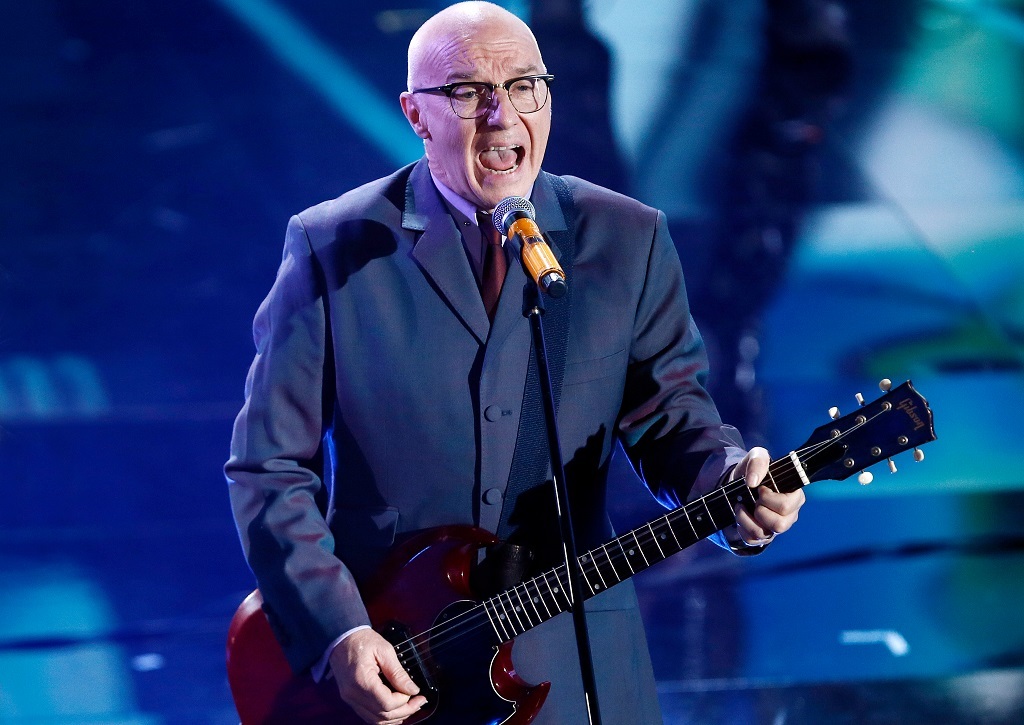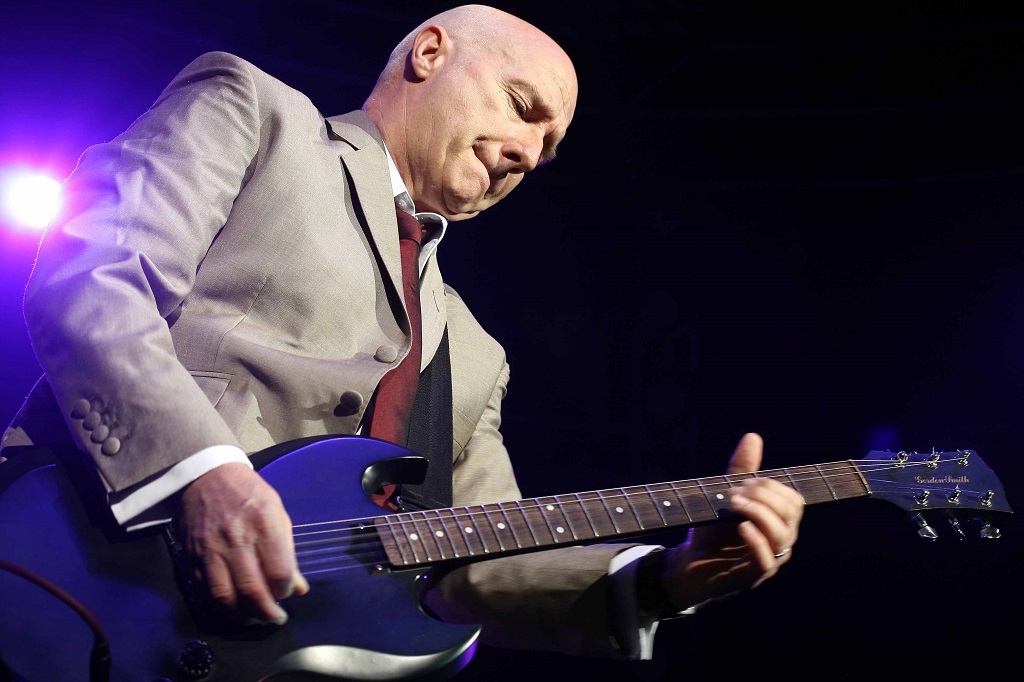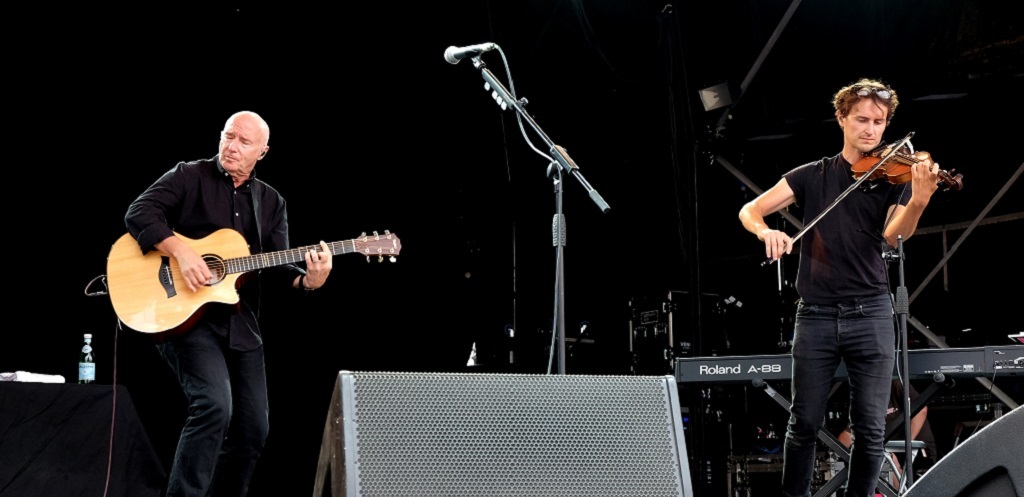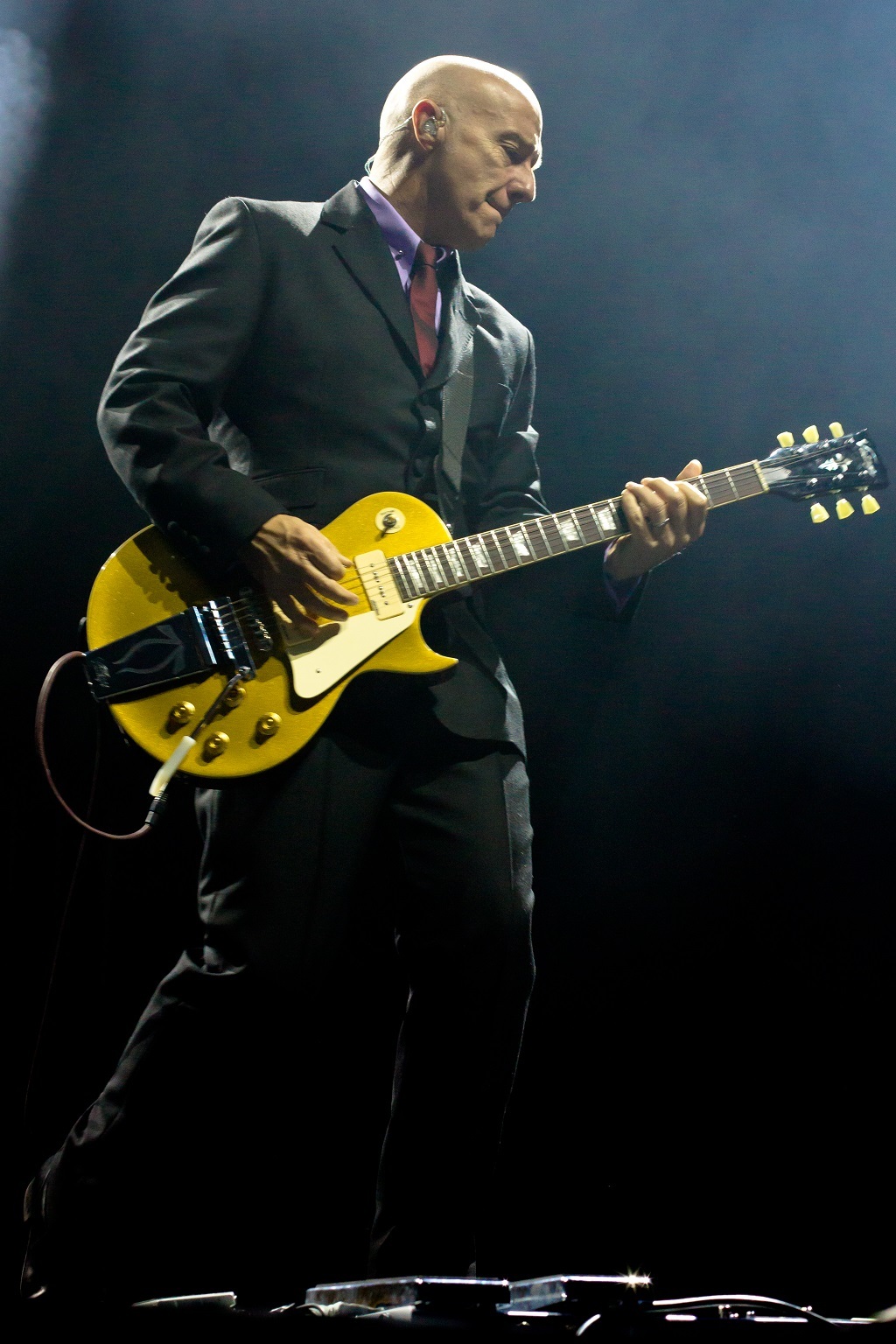Midge Ure is one of the most important figures in the British music and cultural scene of the last 50 years.
That’s not an overstatement – the Scots singer and songwriter was behind Do They Know It’s Christmas? charity single, as well as co-organiser of Live Aid, with Sir Bob Geldof, raising millions of pounds and helping to save lives in the process.
Midge – born James Ure in Cambuslang, South Lanarkshire – was in bands including Slik, Thin Lizzy, Rich Kids and Visage, and most notably as frontman of Ultravox, before stepping out on his own and achieving a number of successful singles, including If I Was, which went to number one in 1985.
He’s still performing, with a gig at this year’s Rewind Scotland festival in Perthshire this summer.
You grew up in Cambuslang – were you a good pupil?
Dreadful. I was dreadful. School held no fascination for me whatsoever. It was back when it was the three Rs, reading, writing, arithmetic stuff. And I didn’t fit in any of those boxes. Nobody ever, ever, all the way through school.
Secondary school I went to Rutherglen Academy, I really pushed myself. They only let me in because I had a high IQ, not because I was good at anything. And nobody anywhere, said ‘You’re only good at singing and drawing and painting, maybe you should try and go to the Glasgow School of Art.’ It was never ever suggested, I was already earmarked as factory fodder. It’s the way it was in those days.
I speak to so many people who say the same thing, that there was no encouragement into the arts.
No absolutely none. In fact I wasn’t allowed to touch the one instrument we had at school, that was the piano – only the teachers were allowed to touch the piano. How encouraging was that?

Midge Ure on stage
Were your family musical at all?
No. My grandmother on my father’s side had a piano in her little flat, a little house, in Carntyne. And when we went over there we used to bang at the piano and drive everybody crazy. But I used to hear my grandfather, and he would try and ramp out a tune, but he was more Les Dawson than anything else. It was all wrong notes, and I don’t know where he got them from, but he used to try and do it. But my musical education was the radio. Living in the tenements on the outskirts of Glasgow, my mother had the radio on all the time so that is where I got my love of music.
Who were your influences?
I think the first ever influence was probably Tommy Steele, because I saw him in a movie where he had a white suit and he had a guitar, and I thought “How cool is that?!” I mean I was very young, I was very influenced by this white suit! Then you go through a whole series of things, the Beatles, Jerry and the Pacemakers, and David Bowie. As you grow up your tastes change and you’re allowed into a world of music you didn’t really realise existed.
When you come back to Scotland, do you enjoy playing gigs near where you grew up?
You know what, it’s really difficult getting gigs in Glasgow, I don’t know why! The right sized venue for the type of performance we’re doing just doesn’t fit. It’s a really niche thing, if you go too large it loses its intimacy, if you go too small it’s too cramped and crowded, and you’ve got to find the right place. So it looks a bit random, what we’re doing, but we’re finding the right sized venues to suit that kind of performance.
Where’s your favourite place to play?
I don’t think there’s a best venue. There’s something about performing in your homeland that’s always good. You’ve just got a cheeky audience. Playing somewhere small like the Renfrew Ferry in Glasgow is fantastic, but the audience tend to be louder than you are. Or you get the other of the scale which is like the small arts places. This is purely for the acoustic shows, the small arts places like the Lemon Tree in Aberdeen, those places are really important not just for musicians, for all the arts, dance, and theatre, all of that. Those places are just incredibly important and they seem to be dying left right and centre, unfortunately.
What’s been your most memorable gig?
Again, for different reasons. I did a thing in Glasgow a few years ago for the opening of the Ryder Cup at the Hydro, and I did it with the Scottish Symphony Orchestra and the band, and I got to perform Vienna with the Orchestra and it was just one of those moments. I don’t know why, I mean I’ve been singing that song for a long time… but the audience that night, 12,000 people on their feet, at the appropriate moment when I hit the ‘Oh Vienna’” at the very end of the song, it was just one of those where you think ‘Yes, that was great.’ I don’t know why but the atmosphere, and the timing, the performance was just right and the reaction was absolutely spontaneous so it was lovely.

Midge Ure and Ultravox were famously denied a number one hit with Vienna, pipped by Joe Dolce Music Theatre’s Shaddap Ya Face
It’s incredible to think people still have such a reaction to that song?
Absolutely. Yeah, like anything these things can become an albatross around your neck but in order to avoid that I just reworked the song. I mean, if I do a show and I don’t do some of those songs, people will be disappointed, you’ll be hung drawn and quartered. So I kinda reinvent the song for myself and that keeps me interested but still keeps it fresh for the audience.
How do you go about song writing?
That’s a dark art. I have no idea. Honestly! Having written a lot of songs that have been very successful I couldn’t tell you how it works. There’s something absolutely instinctive about it. It’s like anything. Ask a painter how they start a painting or a sculptor how they start on this big slab of marble and end up with this beautiful object, a lot of it is trial and error, a lot of it is purely in your head, and you instinctively know when you’ve done something that’s okay, that’s worthy.
And then, I have this weird situation where in order to make it popular, I have to hand it across to a thousand other people, who’ve all got to do their jobs and tick their boxes, to get it out there, to let the public know it’s there, to get it on the radio, to spread the word in a way, so I’ve got no idea. I think when it comes to a song, I think when you’re finished it, if you are still satisfied with what you’ve done the day after you’ve done it, I think you’ve done alright. Instinctively, like anything, you know that you’re scraping the bottom of the barrel because it just doesn’t work. If it’s too hard, if it’s too difficult to do then it’s not worth finishing.
Where’s your preferred place for writing?
I write unlike anybody else I know. Most writers are just incredibly prolific writers, they do it in hotel rooms or in spare moments. They’re jotting things down all the time. I have to be in my little studio, surrounded by my toys, my tools, my computer and keyboards and guitars, and all of that stuff. When I write a song, I write the song and make the production. I make the record and write the song at the same time. Instead of just sitting there at a piano saying ‘there’s a nice chord, there’s a nice melody’, and then write some lyrics, and then go and record it. The recording, writing, creative process, is all one process for me.
All in one go then?
All in one, and sometimes it takes forever, but there you go.
Do you spend much time in Scotland?
I do, I do. I would move back tomorrow, but until the daughters all leave home, which I’m not sure is ever going to happen, I can’t really contemplate it. I love it dearly.

Midge Ure turns 65 this October
How many daughters do you have?
Four – that I know of! (Laughs)
Do you have a favourite place in Scotland?
We keep talking about going back to the highlands. I was married on Mul, and it’s beautiful. The West Coast, I absolutely love. I love the fact you can be in the centre of Glasgow and jump in a car and within 45 minutes you’re in some of the most outstanding countryside in the world. I love the diversity of it all, I love the open space, from living in London. So yeah, somewhere along the west coast, the Kyle of Lochalsh or Plockton or something like that, I just love that West Coast.
Is there a song you wish you had written?
There are lots of songs I wish I’d written. I still hear some today, every so often something comes on the radio that hasn’t been designed by a team of writers, that hasn’t come out of the glorified musical mincing machine, where you put certain elements together and you end up with a hit record. It’s not come from a hit factory. You listen to something like Kate Bush’s The Man with the Child in His Eyes and you think, ‘How do you write something like that when you’re 15 or 14?’ like she did. And it’s just outstanding.
So there are still moments there where you hear pieces of music where you think, ‘I don’t think I’m capable of ever writing something that stunning, or that beautiful’, and that’s a good thing. I’m not being self-deprecating here but it’s a good thing to still have something there to strive for, that knocks you into a cocked hat, and puts you back in your place, just when you’re getting cocky and you’ve written something interesting, but you hear something on the radio that just… your stuff pales into insignificance.
What’s your biggest achievement?
I think possibly still being here. This industry is a notoriously short-lived industry, career-wise, you can come along and be really successful for three years and then disappear, and never be seen or heard of again. I’ve been fortunate enough to have 40 odd years doing this as a professional musician, with highs and lows, but that’s the way careers should be. And I’m still allowed to do it and I find that absolutely wondrous. So I think achieving a career out of something that is normally incredibly bite-sized has been a bit of a major achievement for me. I don’t know how I did it, pure luck I think.
I’m sure there’s a lot of talent in there too!
Maybe a smidgen, but that doesn’t get you everywhere.
How did you get involved in Band Aid?
This story has been told an awful lot! Bob and I were friends, and I happened to be doing The Tube, which was a music programme in Newcastle, which was co-hosted by Paula Yates. He phoned Paula and spoke to me, I was in Paula’s dressing room at the time chatting, and he spoke to me and said, ‘I’ve just seen this thing on television, its hideous, I want to do something, I’m not in a position to do something on my own, will you help?’
We met up a couple of days later and came to the obvious conclusion that between the two of us, we’re maybe capable of scraping together a half-baked-idea of a song. We could generate maybe a £100,000, not by having a great song, but only by utilising all our friends’ talents and fame, and that’s what we did. We put together a Christmas song, using the cream of the talents that the UK had at the time.
You’ve done it recently, will you do it again?
We did it for the Ebola crisis, knowing all the time we couldn’t generate the same kind of income because record sales don’t really exist anymore. But the last effort raised in excess of £3million for the Ebola crisis.
What would you have done if you weren’t a musician?
I would have made something with my hands I think, as I said the only thing I was capable of doing was drawing and painting. I was a fantasist. I lived in a fantasy world, but I quite enjoyed making things. I wasn’t very good at it. I think making something with your hands, carpentry, and wood. There was always a lovely smell when you walked into a carpenter’s yard, and I quite liked that.
Do you dabble?
No I’m rubbish at it. I really am rubbish. I’m one of those guys who gets the shelf all wonky and things. I try and do my bit, but it’s probably easier paying someone to do it well in the first place.

Midge Ure still enjoys playing live
We’ve seen you on Celebrity MasterChef.
I think that programme put me off cooking for the rest of my life! I enjoy the process. Everything I do seems to stem from music – the cookery is one thing that it doesn’t, it comes from somewhere else. It’s equally creative and it’s a building process, you put elements together, and what comes out at the end is hopefully interesting, but it’s a very different thing. It has nothing to do with music whatsoever so it’s quite nice for me to do it now and again. I’ll take an entire day out and make an entire menu or an entire feast to feed friends, but I don’t really get into it in a big way just for the family.
So you don’t do the daily cooking?
No, I do! I still do the day to day stuff but we keep it modest and simple.
What else do you to do relax?
There’s a lot I enjoy about photography, but again that’s so tied in to what I do because I’m constantly travelling. I’m not very sporty so there’s not a lot of things that I do outside of what I do. If you look at my web page you’ll see that I’m just all over the place all the time. I seem to be working live more now, than I ever have.
Are you happy doing that?
I don’t know what else I’d do. I know that you could say you could just be at home with the family, but the family have all kind of gone off. My wife and I grab time and go off and do some stuff together when I can. But I’ve done this for such a long time, it’s a bit like saying, ‘Okay, well, don’t breathe for the next couple of hours, don’t blink!’ It’s just second nature, it’s what I do. I still really enjoy it, I still love doing it. You have to love doing this or it’s boring or it’s too much like hard work if you’re pretending that you’re enjoying it – which lots of musicians do – but I still do love the whole process.
Do you have any heroes?
I have lots of heroes, in lots of different areas, I suppose. I think Charles Rennie Mackintosh. There’s someone who fought against the system, who made something that must have been bewildering back in Victorian times for this man to start designing what he did; these futuristic, bizarre furnishings. I think in music terms I have many heroes, I think people who stick to what they do, instead of jumping on bandwagons all the time. I really admire that. I really admire people who swim upstream and go against the grain, because they’re the ones who tend to change everything. Just when you think you’re hitting your head off a brick wall, all of a sudden the world sees what you’re doing and gets it, and that changes it all. So yeah, many heroes.
Do you have any collections?
I used to collect cars. I collected objects of desire! When I first made some money, all these things you dream of having, I bought. So I had classic old sports cars and old Jaguars, old Porsches, and old whatever. I had a big collection of those. I started buying chairs, so I’d buy arts and crafts, and old chairs which I still have a few of. Things change when you’re married, all the stuff you acquired as a single man tends to get thrown out.
TAGS

